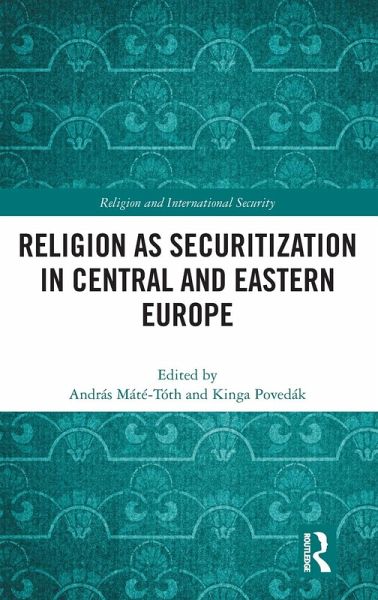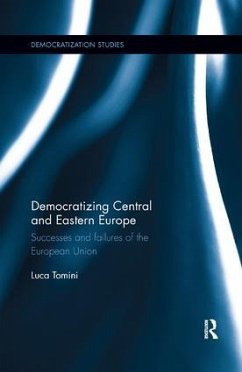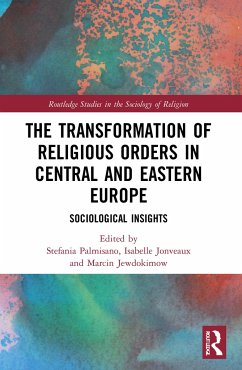
Religion as Securitization in Central and Eastern Europe
Versandkostenfrei!
Versandfertig in 6-10 Tagen
160,99 €
inkl. MwSt.
Weitere Ausgaben:

PAYBACK Punkte
80 °P sammeln!
Religion as Securitization in Central and Eastern Europe examines the significance of securitization theory as a reference point in understanding current religious, socio-cultural, and political processes in Central and Eastern Europe (CEE).It explores contemporary social processes and discourses on security linked to religion and religious institutions. CEE has experienced many confluences of security issues with religious interpretations and world views. For instance, the international refugee and migration crisis could not be separated from the counterpoint between Christianity and Islam in...
Religion as Securitization in Central and Eastern Europe examines the significance of securitization theory as a reference point in understanding current religious, socio-cultural, and political processes in Central and Eastern Europe (CEE).
It explores contemporary social processes and discourses on security linked to religion and religious institutions. CEE has experienced many confluences of security issues with religious interpretations and world views. For instance, the international refugee and migration crisis could not be separated from the counterpoint between Christianity and Islam in political discussions. Similarly, the debates on LGBT family recognition and the traditional family model are inseparable from the "Christian family" as a reference point. The security needs of the region are particularly acute trigger points, which can be instrumentalized by political power. In other words, the threat sensitivities of collective identity make the region particularly well suited to being a focus of securitization, both from the host side and from the discourses that are enforced from above. In this volume, the authors approach the validity of securitization in relation to religion, and religion itself as securitization, from a broader perspective. They show not only what religious facts and aspects have become threatening in the process of securitization but also that the function of religion in the CEE region can be described and understood primarily as securitization. This unique collection of studies offers a comprehensive theoretical and methodological approach, while the case studies are drawn from more than seven countries in the region, by leading scholars.
The book will be of interest to scholars from a wide range of disciplines including political science, history, anthropology, and religious studies. It will also function as an important introductory work for students to this specific area of research.
It explores contemporary social processes and discourses on security linked to religion and religious institutions. CEE has experienced many confluences of security issues with religious interpretations and world views. For instance, the international refugee and migration crisis could not be separated from the counterpoint between Christianity and Islam in political discussions. Similarly, the debates on LGBT family recognition and the traditional family model are inseparable from the "Christian family" as a reference point. The security needs of the region are particularly acute trigger points, which can be instrumentalized by political power. In other words, the threat sensitivities of collective identity make the region particularly well suited to being a focus of securitization, both from the host side and from the discourses that are enforced from above. In this volume, the authors approach the validity of securitization in relation to religion, and religion itself as securitization, from a broader perspective. They show not only what religious facts and aspects have become threatening in the process of securitization but also that the function of religion in the CEE region can be described and understood primarily as securitization. This unique collection of studies offers a comprehensive theoretical and methodological approach, while the case studies are drawn from more than seven countries in the region, by leading scholars.
The book will be of interest to scholars from a wide range of disciplines including political science, history, anthropology, and religious studies. It will also function as an important introductory work for students to this specific area of research.














